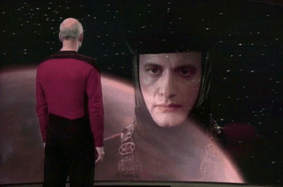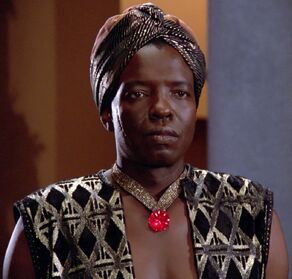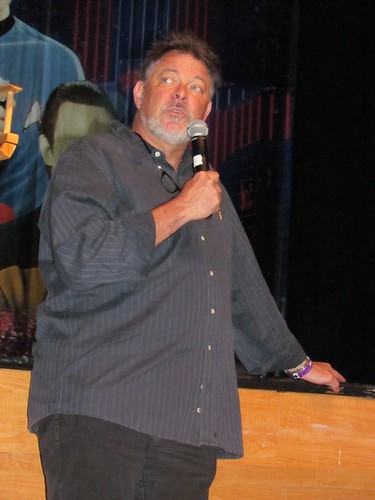Thou hast put an upward reach in the heart of man.
-- Harry Kemp
-- Harry Kemp
Mankind has always been fascinated with the future. From the grand fate of the universe, to our own tiny planet, to our progeny’s destiny, we humans are constantly thinking about how to shape the years to come, and rightly so. Speculative fiction is fertile ground for this kind of wonder. And again, this is a good thing. But beyond the improvement of a technological device or the creation of a new energy source, how does speculative fiction help us consider the ultimate nature of reality and how humanity may one day possibly come to exist in, and shape it? We’ll explore that in this meditation.
But first it’s probably a good idea to gain some vantage on what’s meant by “the upward reach of man.” Let’s get a few philosophers’ opinions on this broad subject and see if we can narrow our frame of reference just a wee bit.
What is the Upward Reach of Man
For I doubt not through the ages
one increasing purpose runs.
-- Alfred, Lord Tennyson
In his cornerstone document, “The Bluebook of the John Birch Society,” the late Robert Welch, agreeing with Tennyson, wrote:
Neither Tennyson nor any other sane man could doubt this fact…But first, let us ask, whose purpose? God’s? Or man’s? But if man has had one increasing purpose through the ages, from what source did it come, and who decided what the direction of that purpose was to be? (p. 136)
Welch goes on to argue that a creator, a divine being, has set that purpose in man’s heart. Though he firmly roots his own understanding of that divinity in the traditional monotheistic outlook shared by most of humanity – and in the precepts of Christianity in particular – what exactly one’s provincial interpretation is of that divinity Welch leaves to each individual. He continues by saying:
And agreeing that a Creator greater than ourselves has visibly endowed us with purpose, we can give far more of our energy and dedication to serving that purpose better. That there is a purpose in man beyond anything called for by his individual needs, and far greater than his personal desires, can be denied only by the most depraved maniac or the most ignorant fool. (p. 137)… For look with me first at the common denominators of all of our great religions. That man shall not steal…is common to them all. So is the injunction that man shall not murder nor harm his fellow man. So are the concepts of kindness, and charity, and restraint of appetites, and industriousness, and respect for age and experience… and the expectation of justice, and faith in a happier future… But...these are also exactly the characteristics with which evolutionary selection has gradually endowed man, to enable him to rise out of an animal existence, haltingly but surely, towards a more humane civilization and a promise of a tremendously more wonderful future. (pgs. 139-140)… Not only are we a part of some mighty purpose beyond our understanding, and not only do we have a clear duty to be true to that purpose…but all human experience shows that the total happiness of any generation and of its posterity is directly tied to the respect of that generation for the “upward reach” in man’s nature. (p.141) (all emphasis mine).World-famous yogi, the late Gopi Krishna, in his work, “Kundalini: Empowering Human Evolution,” appears to share this sentiment with these words:
Digression from the righteous life prescribed in all revealed scriptures, in other words, from the principles of evolution, is the surest path to hell, to mental aberration, abnormality, obsolescence and decay. It does not alter the position if the digressers are individuals or whole societies, the result is the same. (p.31)… The human personality is not the result of a mysterious bio-chemical activity of the brain but the product of an intelligent energy, designated as Prana by adepts since the time of the Vedas. (p.33)… In Indian wisdom, the deity ruling human evolution is known as the Goddess Kundalini. If souls are immortal there must be a deathless Ocean of Intelligence from which they arise. In that case evolution, too, must be governed by intelligent laws. (p.43)The great Prussian philosopher Immanuel Kant spoke these words with respect to reason and the enlightenment of man:
Whatever concept one may hold, from a metaphysical point of view, concerning the freedom of the will, certainly its appearances, which are human actions, like every other natural event are determined by universal laws. However obscure their causes, history, which is concerned with narrating these appearances, permits us to hope that if we attend to the play of freedom of the human will in the large, we may be able to discern a regular movement in it, and that what seems complex and chaotic in the single individual may be seen from the standpoint of the human race as a whole to be a steady and progressive though slow evolution of its original endowment. (emphasis mine. From the introduction to the “Idea for a General History with a Cosmopolitan Purpose”).In Kant’s Second Thesis of his “General History” we find:
Reason in a creature is a faculty of widening the rules and purposes of the use of all its powers far beyond natural instinct; it acknowledges no limits to its projects. Reason itself does not work instinctively, but requires trial, practice, and instruction in order gradually to progress from one level of insight to another. Therefore a single man would have to live excessively long in order to learn to make full use of all his natural capacities. Since Nature has set only a short period for his life, she needs a perhaps unreckonable series of generations, each of which passes its own enlightenment to its successor in order finally to bring the seeds of enlightenment to that degree of development in our race which is completely suitable to Nature’s purpose. This point of time must be, at least as an ideal, the goal of man’s efforts, for otherwise his natural capacities would have to be counted as for the most part vain and aimless (emphasis mine)… Nature does nothing in vain, and in the use of means to her goals she is not prodigal. Her giving to man reason and the freedom of the will which depends upon it is clear indication of her purpose. Man accordingly was not to be guided by instinct, not nurtured and instructed with ready-made knowledge; rather, he should bring forth everything out of his own resources.
What, then, is the conclusion of all these noble words? It is that the upward reach of man, in a very basic sense, it seems, is the infusion into our species (by nature or divine intervention, or perhaps both) of an intrinsic desire to better ourselves and our posterity across every generation, across all ages, perhaps to the end of some ultimate, master cosmic plan.
But is This “Upward Reach” Even Possible & What is its Expression
You see, my people once lived in caves.
And we then learned to build huts,
and in time to build ships like this one.
-- Jean-Luc Picard
“Who Watches the Watchers”
Star Trek: The Next Generation
Speculative fiction holds a variety of answers as to whether this so-called upward reach is possible. From technological progress to social conventions and cultural mores, SF (as I shall shorten it from here on) – from the Golden Age to modern times – is replete with references to mankind’s ultimate place in the universe and his special attributes which testify to the same.
But is there truth to this?
History can answer that question.
Early man’s efforts to rise above his primitive circumstances of stone tools, sheep skins, and huts and shanties, to the level of steel highrises, airplanes, genetic engineering, current efforts in space exploration, and beyond are legion. Thus, this writer opines that it is undeniable that the scientific evolution of man is indeed possible. But what is the limit of this prowess? Is it mere technological, on which the aforementioned examples focus? Or, perhaps, does it even exceed those limits as well?
The above quote from the third season of Star Trek: The Next Generation is from a scene between Mintaka III leader Nuria and Captain Jean-Luc Picard of the Federation starship Enterprise-D. In one of the finest moments in TNG history, Picard instructs the Vulcanoid female in the principle of the evolution of sentient life. Though much of Picard’s emphasis centers on sentient beings’ ability to develop new technologies – to “weave cloth, make a bow,” and so forth – his obvious implication is that, with time, the power of the mind to change its world, the universe, for the betterment of that life is unquestionable.
And this is even perhaps to the point of godhood itself.
 |
| Picard faces the quasi-omnipotent Q Continuum "Encounter at Farpoint" |
Other SF programs echo this faith.
 |
| The menacing First Ones, the Shadows |
Ultimately it is the human heroes of B5 who discover this and liberate the lesser races to their own evolutionary path unguided and unimpeded by the Vorlon-Shadow yoke. And thus the Third Age of the galaxy, of mankind, begins.
 |
| Ascended Ancient, Morgan La Fey, "Stargate SG-1" |
However, in future seasons the philosophy of ascension comes to conflict when the Ancients’ old enemy, the Ori, begin a war for intergalactic control of all mortals beneath them. Their quest for total power is challenged by the humans of earth, who find the means to lead in their defeat, freeing the galaxy’s people to realize enlightenment on their own, as the Ancients always believed correct.
These are only three examples, but SF is overflowing with such notions of an ultimate reality outside of – or perhaps better said – beyond our current understanding of it. And SF does its best, I believe, when it focuses on issues of human destiny and evolution.
Yeah, Yeah, But Humans Are…
Eat, sleep, defecate, procreate. That’s all
they [insects] do. That’s all we do too, but at
least insects don’t kid themselves that it’s
anything more than that.
-- Dr. Bambi Berenbaum
“War of the Coprophages”
The X-Files
And thus the above quote of fictional entomologist Dr. Bambi Berenbaum from a 1996 episode of The X-Files.
This rather cynical comparison of human beings to cockroaches spoken to FBI special agent Fox Mulder may in fact be considered an apt one by some. After all human beings have manifested the capacity for great evil and wickedness (as may be defined by human experience and/or divine revelation) in addition to profound acts of good.
Again, Immanuel Kant:
Since men in their endeavors behave, on the whole, not just instinctively, like the brutes, nor yet like rational citizens of the world according to some agreed-on plan, no history of man conceived according to a plan seems to be possible, as it might be possible to have such a history of bees or beavers. One cannot suppress a certain indignation when one sees men’s actions on the great world-stage and finds, beside the wisdom that appears here and there among individuals, everything in the large woven together from folly, childish vanity, even from childish malice and destructiveness. In the end, one does not know what to think of the human race, so conceited in its gifts.
Inevitable questions arise from such an evaluation. Are human beings creatures of a god, of the universe that gave rise to them? Do they have a special fulfillment to attain to in that universe? Are they alone in trying to attain it, or, more clearly, are they the only sentient species in the universe pulling toward that upward reach? Most empirical evolutionists will say “no” at least to the first half of question 1 and all of question 2. Whether we’re alone as a species in the universe they leave to debate. Theologians and some philosophers will definitely affirm questions 1 and 2 positively, and (mostly) leave question 3 for potential speculation.
However, the Jainist must, out of simple logic and observation, agree with the formerly-referenced philosophers that, though humanity manifests distressingly great chaotic power – most of which is given rise by our animal nature, what the Judeo-Christian Bible calls, “the law in our members,” genetics – there is a flipside which reveals itself in our art, creativity, inventions, capacity for empathy, kindness, willingness to cooperate, even sacrifice in the face of great odds, including to the point of personal, physical death.
And these capacities too, as Welch stated earlier, appear to be part of our biology as well. So while our genes may be selfish – motivating us to seek our own good over that of others, and especially to reproduce ourselves with a near abandonment of all responsibility – there are countless examples of the opposite, where human beings put their personal ambitions and lusts aside for the greater good of the species as a whole.
This intrinsic, and, if you desire, “spiritual” understanding does not need to be trained into us, for it is already implanted, though it certainly may be cultivated, refined, and honed into greater reflections of larger, more universal truths. Some call it the conscience. Yet whatever name or characteristic, it compels us to reach forward and never give up until we have achieved that destiny for which we were made in the first instance.
And these actions, more than any high-minded notions of religion or philosophy, are what incline the Jainist to accept the truth of the upward reach of man.
And We Are Responsible for That Upward Reach
Without the hope that things will get
better, that our inheritors will know a
world that is fuller and richer than our
own, life is pointless, and evolution is
vastly overrated.
-- Ambassador Delenn
“A Voice in the Wilderness, Part 1”
Babylon 5
Whatever or whomever has put us on this planet took pains to infuse us with the capacity for self-evaluation and self-improvement. And through these instruments of reflection and action, this power further gifted us with the ability to better the race in unison. We cannot neglect this truth. And we cannot shrink from it as immature children who are too afraid to let the scales fall from our eyes so that we may grasp the larger knowledge of the universe. Humanity must, will, mature. The Jainist says boldly that those who deny this capacity are indeed blind to truth, willfully foolish. And those who neglect it, neglect their responsibility both to our progenitors who’ve given so much to get us where we are, and our progeny ahead who await their turn to receive from us that baton of promise which they in turn will pass on, even to the last generation.
Let us not fail either of them.
And let us use the medium of speculative fiction to bolster this understanding.
We’ve meditated together on the unfolding dignity of humanity. I believe this increasing dignity not only possible, but actual. Real. And so I leave you with this quote from Captain John Sheridan, another (fictional) traveler on the road toward the upward reach of man.
…We have to make people lift their eyes back
to the horizon and see the line of ancestors
behind us saying: ‘Make my life have meaning,’
and to our inheritors before us saying: ‘Create
the world we will live in.’ We’re not just holding
jobs and having dinner, we are in the process
of building the future… Only by making people
understand that can we hope to create a better
world for ourselves and our posterity.
-- Captain John Sheridan,
“And Now for a Word”
Babylon 5
To the upward reach of man.





